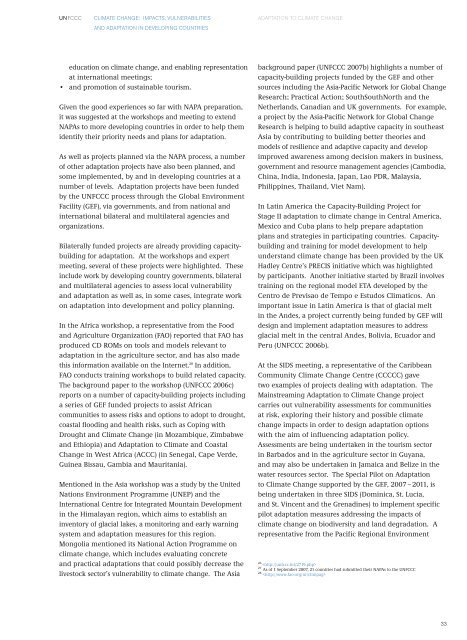impacts
Create successful ePaper yourself
Turn your PDF publications into a flip-book with our unique Google optimized e-Paper software.
UNFCCC<br />
CLIMATE CHANGE: IMPACTS, VULNERABILITIES<br />
AND ADAPTATION IN DEVELOPING COUNTRIES<br />
ADAPTATION TO CLIMATE CHANGE<br />
education on climate change, and enabling representation<br />
at international meetings;<br />
• and promotion of sustainable tourism.<br />
Given the good experiences so far with NAPA preparation,<br />
it was suggested at the workshops and meeting to extend<br />
NAPAs to more developing countries in order to help them<br />
identify their priority needs and plans for adaptation.<br />
As well as projects planned via the NAPA process, a number<br />
of other adaptation projects have also been planned, and<br />
some implemented, by and in developing countries at a<br />
number of levels. Adaptation projects have been funded<br />
by the UNFCCC process through the Global Environment<br />
Facility (GEF), via governments, and from national and<br />
international bilateral and multilateral agencies and<br />
organizations.<br />
Bilaterally funded projects are already providing capacitybuilding<br />
for adaptation. At the workshops and expert<br />
meeting, several of these projects were highlighted. These<br />
include work by developing country governments, bilateral<br />
and multilateral agencies to assess local vulnerability<br />
and adaptation as well as, in some cases, integrate work<br />
on adaptation into development and policy planning.<br />
In the Africa workshop, a representative from the Food<br />
and Agriculture Organization (FAO) reported that FAO has<br />
produced CD ROMs on tools and models relevant to<br />
adaptation in the agriculture sector, and has also made<br />
this information available on the Internet. 28 In addition,<br />
FAO conducts training workshops to build related capacity.<br />
The background paper to the workshop (UNFCCC 2006c)<br />
reports on a number of capacity-building projects including<br />
a series of GEF funded projects to assist African<br />
communities to assess risks and options to adopt to drought,<br />
coastal flooding and health risks, such as Coping with<br />
Drought and Climate Change (in Mozambique, Zimbabwe<br />
and Ethiopia) and Adaptation to Climate and Coastal<br />
Change in West Africa (ACCC) (in Senegal, Cape Verde,<br />
Guinea Bissau, Gambia and Mauritania).<br />
Mentioned in the Asia workshop was a study by the United<br />
Nations Environment Programme (UNEP) and the<br />
International Centre for Integrated Mountain Development<br />
in the Himalayan region, which aims to establish an<br />
inventory of glacial lakes, a monitoring and early warning<br />
system and adaptation measures for this region.<br />
Mongolia mentioned its National Action Programme on<br />
climate change, which includes evaluating concrete<br />
and practical adaptations that could possibly decrease the<br />
livestock sector’s vulnerability to climate change. The Asia<br />
background paper (UNFCCC 2007b) highlights a number of<br />
capacity-building projects funded by the GEF and other<br />
sources including the Asia-Pacific Network for Global Change<br />
Research; Practical Action; SouthSouthNorth and the<br />
Netherlands, Canadian and UK governments. For example,<br />
a project by the Asia-Pacific Network for Global Change<br />
Research is helping to build adaptive capacity in southeast<br />
Asia by contributing to building better theories and<br />
models of resilience and adaptive capacity and develop<br />
improved awareness among decision makers in business,<br />
government and resource management agencies (Cambodia,<br />
China, India, Indonesia, Japan, Lao PDR, Malaysia,<br />
Philippines, Thailand, Viet Nam).<br />
In Latin America the Capacity-Building Project for<br />
Stage II adaptation to climate change in Central America,<br />
Mexico and Cuba plans to help prepare adaptation<br />
plans and strategies in participating countries. Capacitybuilding<br />
and training for model development to help<br />
understand climate change has been provided by the UK<br />
Hadley Centre’s PRECIS initiative which was highlighted<br />
by participants. Another initiative started by Brazil involves<br />
training on the regional model ETA developed by the<br />
Centro de Previsao de Tempo e Estudos Climaticos. An<br />
important issue in Latin America is that of glacial melt<br />
in the Andes, a project currently being funded by GEF will<br />
design and implement adaptation measures to address<br />
glacial melt in the central Andes, Bolivia, Ecuador and<br />
Peru (UNFCCC 2006b).<br />
At the SIDS meeting, a representative of the Caribbean<br />
Community Climate Change Centre (CCCCC) gave<br />
two examples of projects dealing with adaptation. The<br />
Mainstreaming Adaptation to Climate Change project<br />
carries out vulnerability assessments for communities<br />
at risk, exploring their history and possible climate<br />
change <strong>impacts</strong> in order to design adaptation options<br />
with the aim of influencing adaptation policy.<br />
Assessments are being undertaken in the tourism sector<br />
in Barbados and in the agriculture sector in Guyana,<br />
and may also be undertaken in Jamaica and Belize in the<br />
water resources sector. The Special Pilot on Adaptation<br />
to Climate Change supported by the GEF, 2007 – 2011, is<br />
being undertaken in three SIDS (Dominica, St. Lucia,<br />
and St. Vincent and the Grenadines) to implement specific<br />
pilot adaptation measures addressing the <strong>impacts</strong> of<br />
climate change on biodiversity and land degradation. A<br />
representative from the Pacific Regional Environment<br />
26<br />
<br />
27 As of 1 September 2007, 21 countries had submitted their NAPAs to the UNFCCC<br />
28 <br />
33


